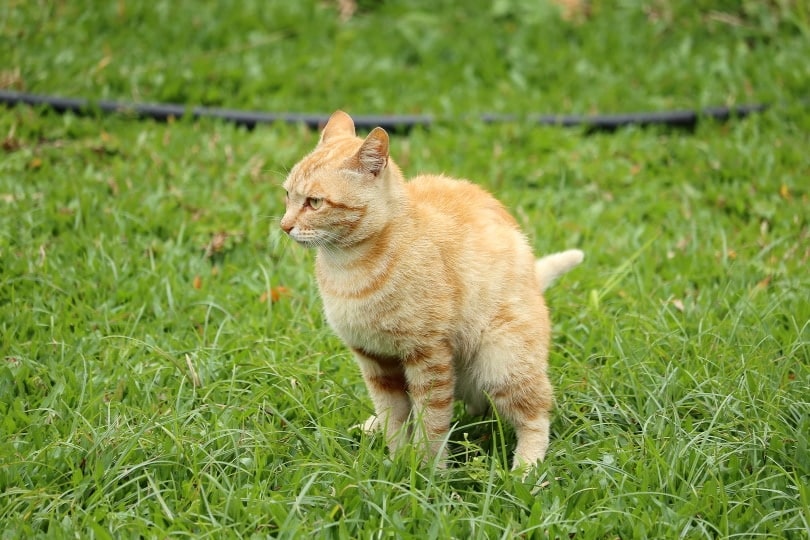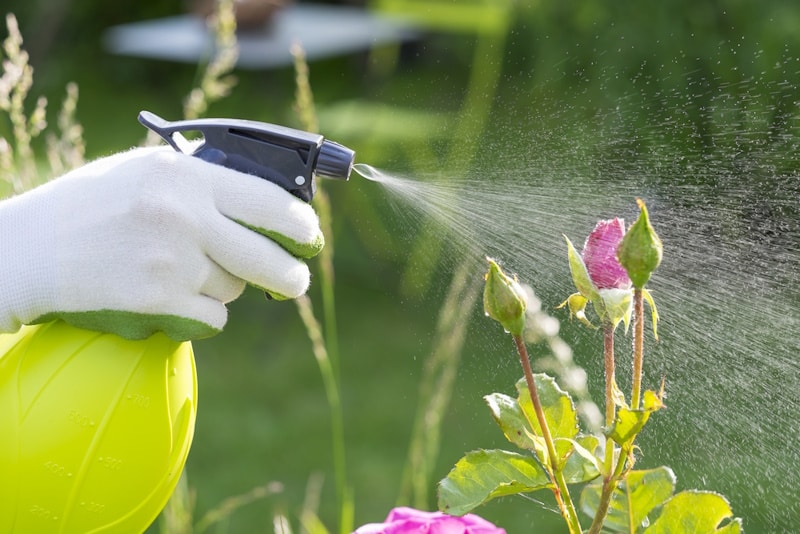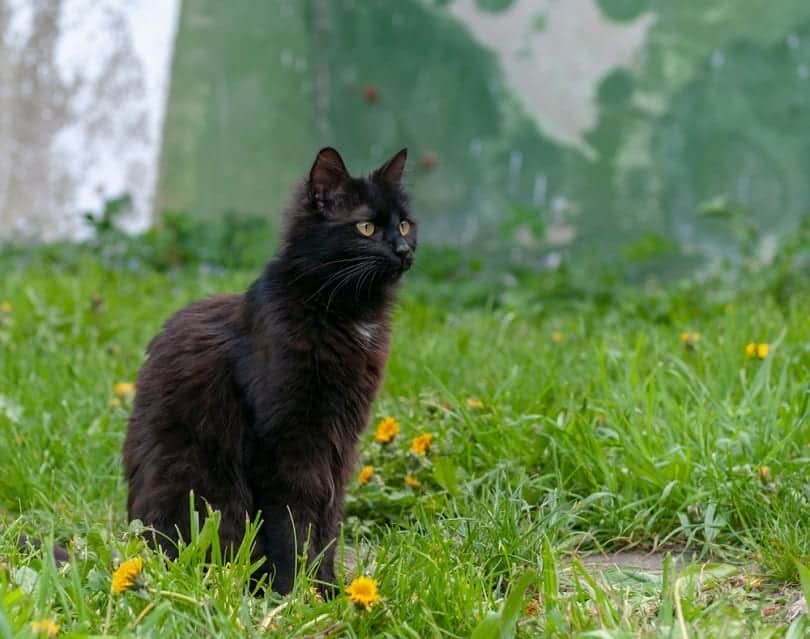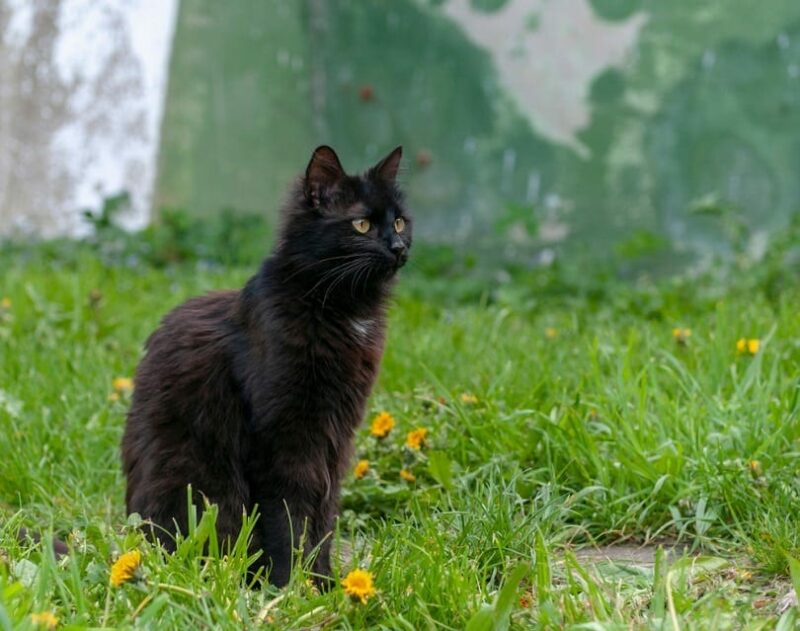There’s no way to prevent stray cats from making your yard into their home without getting your hands dirty. And where there are cats, there will be cat poop. It can be frustrating to have a cat pooping or peeing in your yard, mainly since cat waste contains chemicals that can stunt your plant growth or even kill more sensitive plants. Moreover, their feces can spread parasite eggs, making it a health risk for you and your family. Here are seven ways to safely deter cats from using your yard as their territory without harming them.
The 7 Ways to Keep Cats From Pooping in Your Yard
1. Clean Up the Poop From the Yard

One of the most critical factors in keeping your yard cat-free is to deter them by smell. Cats will mark areas and territories using scent markers. Removing “their” odors is part of preventing cats from your yard, so they don’t claim your yard as a specific part of their territory.
Just removing the poop when you see it isn’t enough. It would be best to spray the area thoroughly with a hose to wash away the pheromones. Otherwise, the cat will come to deposit more waste for you to pick up since they’ve recognized your yard with their scent.
2. Build a Fence Around Your Yard
You can get anti-cat fences with plastic barbs that resemble barbed wire. The plastic barbs won’t seriously harm any cats that run into it as the barbed wire would, but it helps deter them from your yard by making the area around it impassable territory.
Another option is Oscillot fences, which feature a roller at the top of the bar that prevents cats from rebounding up and over the wall by redirecting the kinetic energy your cat is trying to transfer when they jump up to the top of your wall.
When the cat jumps onto the Oscillot fence, it will rebound once to get its paws up to the wall’s top ledge. Then the top ridge rolls down when the cat puts pressure on it to try and haul itself onto the wall, redirecting the kinetic energy from the jump downwards and preventing the cat from continuing its ascent.
Oscillot fences are traditionally used to keep a pet cat in a yard. However, nothing stops you from installing the Oscillot fence backward and facing the roller out to keep cats out of your yard. Whether you’re using the wall to keep your cat in or other cats out, the look on the cat’s face will be priceless.
3. Grow Cat-Deterring Plants

Some plants have anti-cat properties that you can use to ward cats off your property. The apparent options have thorns or other impassable qualities. You can also plant citrus plants or strew citrus peels (lemon or lime is most effective) around your yard to make it smell like citrus. Cats aren’t fond of citrus smells and will avoid places that smell like citrus.
The following plants are also said to emit pungent smells that cats dislike. Planting these may discourage cats from frequenting your yard as they attempt to avoid the plants. However, we need to warn you that some of these plants are considered toxic to cats, so we really think you should try non-toxic options to not harm any animals, especially your own.
- Rosemary
- Coleus canina
- Lavender
- Curry leaves
- Lemongrass
4. Automatic Sprinklers
One way to kill two birds with one stone is to get motion-activated sprinklers. Make sure you set the sensors up near where the cats usually are entering your yard, then you just let them work their magic. Cats won’t usually continue to go somewhere that reflexively sprays them with water just for being there.
Just ensure that your sensors aren’t in a place where your neighbors might accidentally trip them. Although it might sound funny, your neighbors will not appreciate being sprayed by your sprinklers.
5. Cat Repellent Sprays

Another option you can use is a commercial cat repellent spray. These contain scents and pheromones that make cats uncomfortable, leading them to avoid places that smell like cat repellent. It’s a fundamental repellant formula, but it’s effective.
You can even get cat repellent sprays that hook up a nozzle to your garden hose to treat large areas.
6. Use Syrup Bottles or Old CDs
Fill syrup bottles with red water, or even just plain water, and place the bottles somewhere where they’ll be exposed to light. It’s believed that the light refracting through the bottled water will scare cats away and deter them from entering your yard.
If you don’t have syrup bottles or don’t like syrup, you can use old CDs to reflect light and keep cats away. Hang them up with a simple string through the center hole and hang them around your yard to reflect light at nearby cats.
7. Mothballs

Mothballs are thought to have a scent that is harsh to cats and makes them uncomfortable. Placing mothballs around your yard can deter stray cats from coming near your property. However, mothballs may not be the best option if you have plants in your yard since the toxins can affect soil fertility.
Additionally, while stray cats will generally leave things they don’t understand alone, you might want to pass on the mothballs if you have pet cats since they can be highly toxic to your pets. Pet cats generally don’t have the same street smarts that their feral and stray counterparts do and may get into the mothballs accidentally.
Final Thoughts
There are lots of ways to keep cats out of your yard. At the same time, they’re one of the most tenacious and hardy creatures in the world. So, no need to feel bad if you find them frustrating. Even those who love our pet cats find some cat behavior offensive.
Keeping cats out of your yard is a cinch once you start playing the game on their terms. So, get some fresh oranges and add cat deterrent plants to create your new, cat-free yard experience!
Featured Image Credit: Gherghias, Shutterstock











